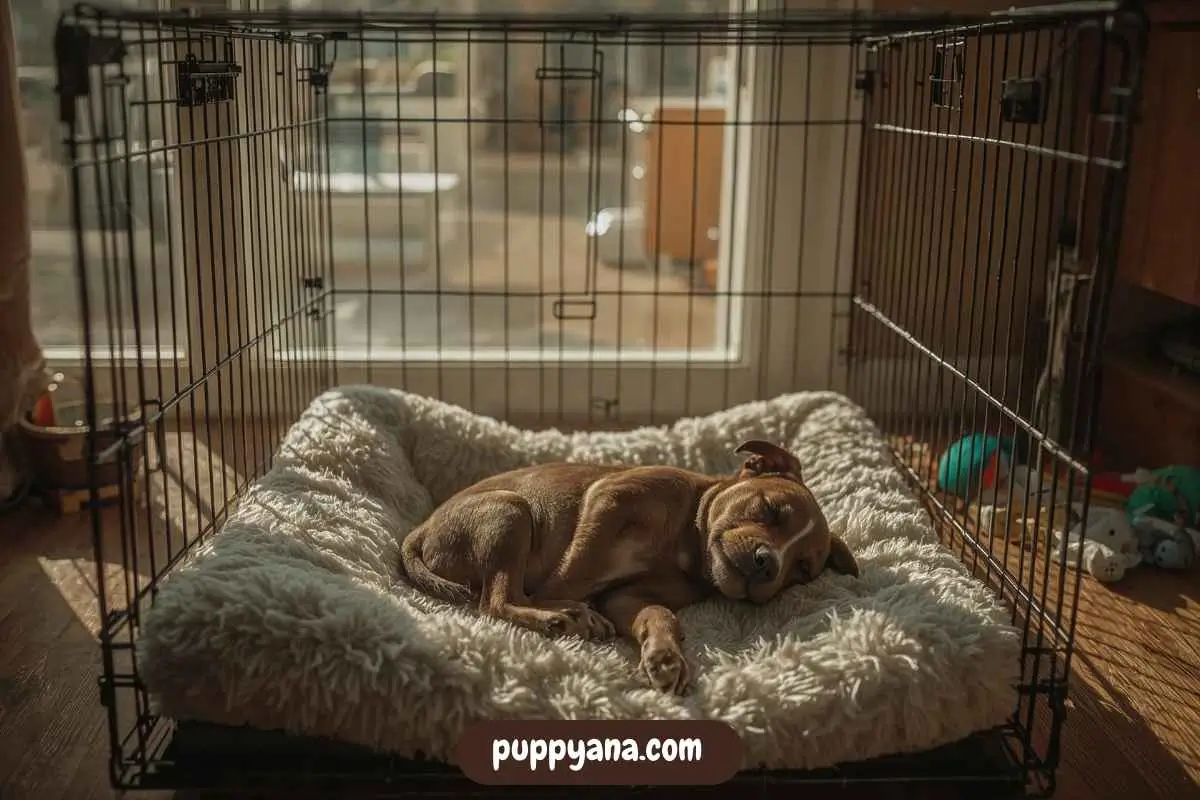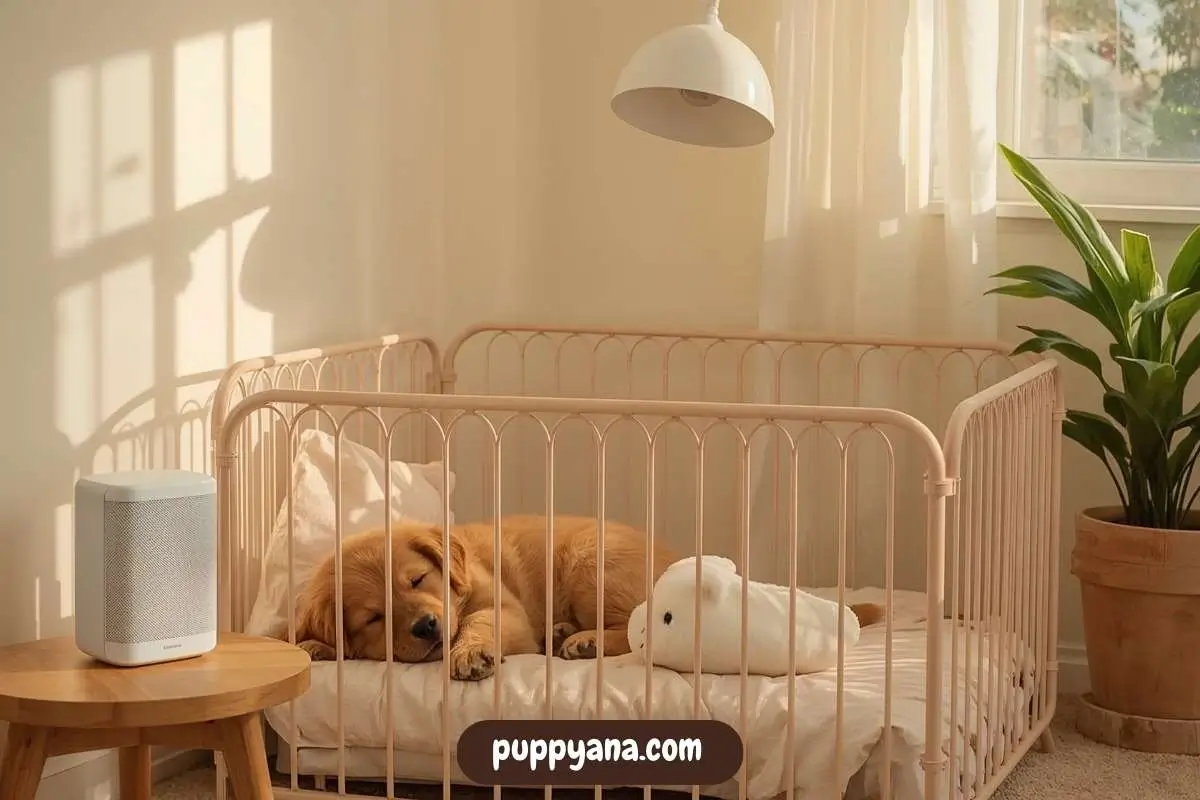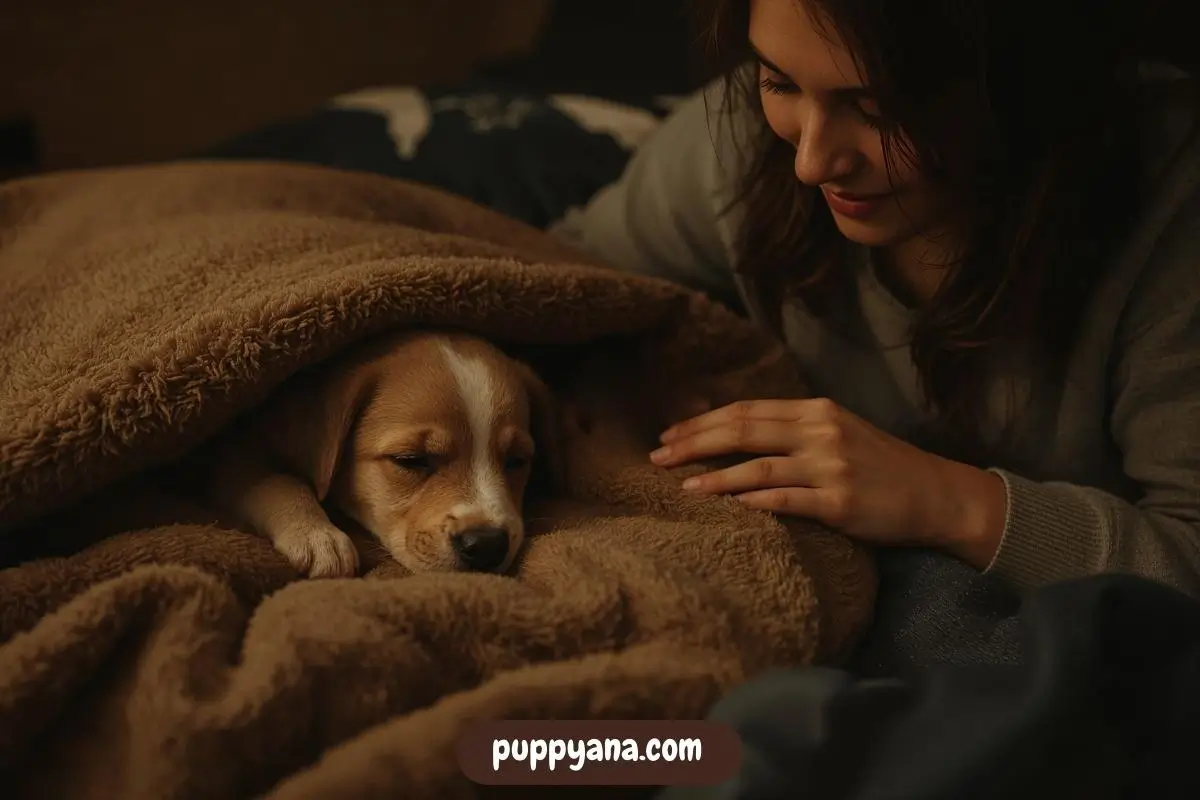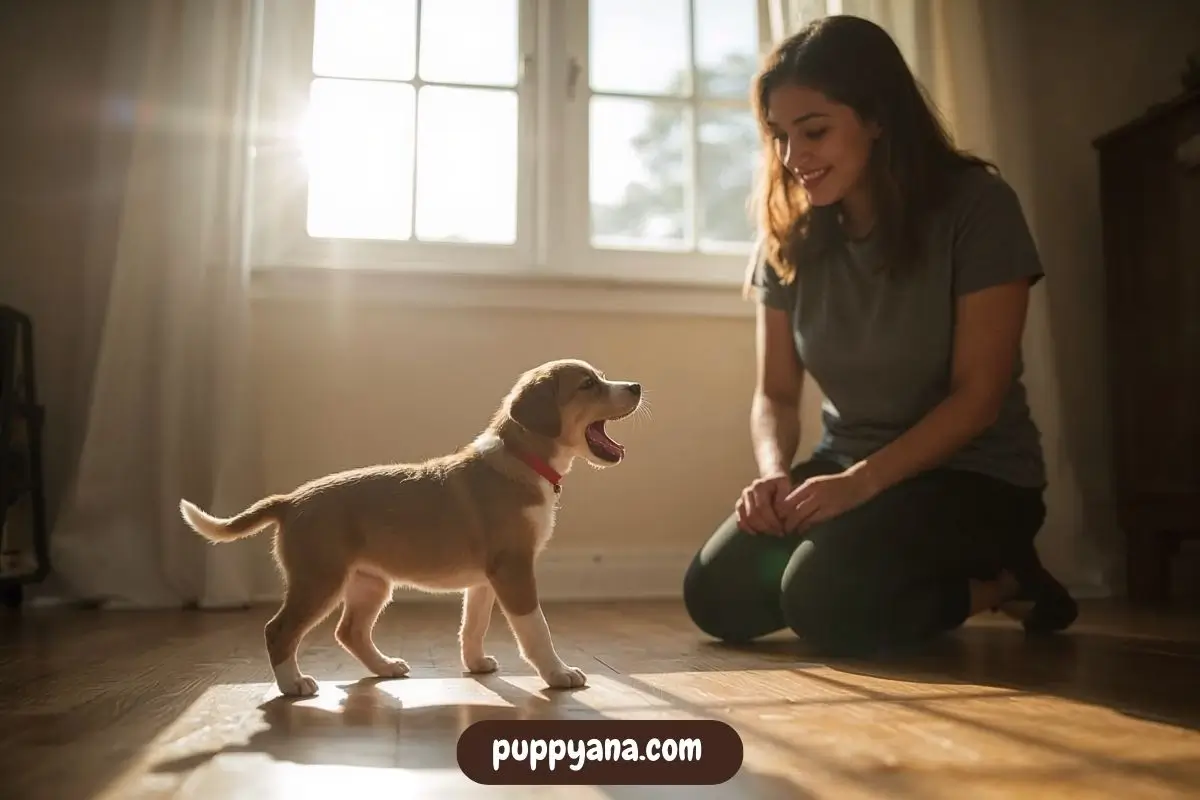Puppies are bundles of energy when they’re awake. They chew, zoom, explore, and play with everything they can find. But in between those bursts of chaos, they seem to crash hard.
If you’re asking how much do puppies sleep, you’re not alone. Many new owners worry when they see their pup sleeping “too much” or wonder if their puppy sleeps too little. The truth is, puppies need a lot more sleep than adult dogs, and it’s completely normal.
In this guide, we’ll explain:
- Puppy sleep needs by age
- Why sleep is so important for growth and development
- What a healthy puppy’s sleep schedule looks like
- Where your puppy should sleep and how to create quiet resting zones
- Common mistakes that interrupt sleep
- And when to be concerned about oversleeping or insomnia
This advice is based on proven experience from real trainers, fosters, and veterinarians. We also gathered insights from organizations like the American Kennel Club, VCA Animal Hospitals, and the PuppyAna expert team.
Let’s help you understand your puppy’s sleep patterns so you both get (some) rest.

Table of Contents
ToggleHow Much Do Puppies Sleep on Average
Most puppies sleep 18 to 20 hours a day, depending on their age. They are only awake for short periods at a time, usually 1 to 2 hours, before needing another nap or rest period.
It may seem like they’re sleeping their days away, but their little bodies are extremely busy growing, building immunity, and adjusting to the world.
General Puppy Sleep Timeline
| Age Range | Average Sleep per Day |
|---|---|
| 0 – 8 weeks | 20 to 22 hours |
| 8 – 12 weeks | 18 to 20 hours |
| 3 – 4 months | 16 to 18 hours |
| 4 – 6 months | 14 to 16 hours |
| 6+ months | 12 to 14 hours |
If your puppy just came home at 8 weeks, don’t be surprised if they nap in their crate for hours at a time, especially after a play session or training routine.
When people ask us at PuppyAna, “How much do puppies sleep at 10 weeks?” we usually say: a lot more than you think, and that’s a good thing.
Why Puppies Need So Much Sleep
Think of your puppy as a newborn learning how to be a dog. Sleep is essential for their physical development, brain function, and behavior.
Sleep helps puppies:
- Grow muscles, bones, and joints
- Strengthen their immune system
- Process new experiences and training
- Stay calm, confident, and less reactive
- Recover from social or environmental stress
According to puppy development experts, most of a puppy’s growing occurs during sleep, especially in deep sleep stages.
If your puppy doesn’t sleep enough, you may notice more:
- Nipping
- Whining
- Tantrums during walks
- Trouble focusing during training
Like toddlers, overtired puppies act wild and then crash hard. Quality naps help improve everything from behavior to bonding.
Signs Your Puppy Is Getting Enough Sleep
It’s common to worry that your puppy is sleeping too much. But if they’re healthy and happy when they’re awake, it probably means everything is right on track.
A well-rested puppy usually:
- Wakes up fresh and alert
- Plays gently or energetically between naps
- Eats with a good appetite
- Naps silently without pacing or restlessness
- Settles down easily in safe spaces
If you notice these signs, you can stop worrying about how much your puppy sleeps and just enjoy those quiet moments while they last.

How to Create a Healthy Puppy Sleep Routine
Helping your puppy sleep well during the day and night starts with good structure and habits. Sleep is not just about bedtime, it’s about rhythm, consistency, and quality.
Tips for Building a Good Sleep Routine
- Use the same sleep location each time, like a crate or enclosed gate area
- Feed and potty on the same daily schedule
- Rotate play → train → potty → sleep cycles
- Limit constant stimulation like loud TV, yelling, or kids running
- Offer calming toys or white noise machines near their bed
At PuppyAna, we recommend structuring your day in blocks. Example: 7 am potty break, 8 am food, 8:30 am play, 9 am nap. Once you repeat this 3–4 days in a row, your puppy starts syncing their naps naturally.
If possible, allow 2 to 3 hours of daytime rest at a time, especially after meals, outings, or social events.
What Time Should Puppies Go to Bed at Night
Just like babies, puppies thrive on a bedtime routine. Many new owners ask not just how much do puppies sleep, but when they should go to bed for the night. And the answer depends on two things: your schedule and consistency.
Ideal Puppy Bedtime
Most puppies do best with a bedtime between 8 pm and 10 pm. This gives them time to settle, reduces accidental messes after dark, and creates a clear difference between daylight play and night sleep.
The important part is choosing a time that you can stick to daily, and avoiding late-night overstimulation.
Steps for a Good Nighttime Routine
- 1 hour before bed: limited play or high-energy activities
- 30 minutes before bed: last potty break
- Keep lights low, voices soft, and no wild games
- Use a crate or safe zone where the puppy always sleeps at night
- Avoid unnecessary attention after placing the puppy to bed
If your bedtime is 10 pm, start quiet time around 8:30–9:00. Within a week or two, your puppy will adjust to your rhythm and begin to wind down automatically.
Can You Force a Puppy to Sleep
You cannot (and should not) force a puppy to sleep, but you can create conditions that make rest much more likely.
Puppies want to sleep naturally. What often keeps them awake is overstimulation, not structure.
Ways to encourage puppy nap time:
- Put them in a soft, quiet crate
- Close curtains if they watch people or traffic
- Give a soft snuggle toy or heartbeat mimic
- Leave the room for a few minutes to remove distractions
- Avoid touching or talking if they get squirmy, let them settle down
You can also give them light calming classical music or white noise to help block outdoor or indoor disruptions.
Once puppies realize rest time is predictable and comfortable, they stop fighting it. Within a few days, most new puppies begin napping without being told.

Where Should Puppies Sleep During the Day and Night
New puppy owners often ask: Should my puppy nap in the same place all day?
The answer: it helps.
While puppies can nap in different safe places, giving them one familiar sleeping zone teaches them to settle faster and feel secure when tired.
Good places for your puppy to sleep:
- A crate in a quiet area of your home
- A covered pen or “puppy play den”
- A soft bed in their corner of the living room
- A gated section near your feet while working
- On your lap occasionally (but not always)
What matters most is consistency, not location. If your puppy naps on the couch sometimes and in a loud room other times, they’ll struggle to build reliable nap routines.
PDSA reminds puppy owners to keep bedtime free of stimulation for true rest. See their tips on puppy sleep environments.
Should You Wake a Sleeping Puppy
Normally, no. Let your puppy sleep unless you must wake them for a feeding schedule, potty trip, or medical need.
Waking a sleeping puppy too often can create irritability, interrupted rest, or confusion about when it’s okay to relax.
It’s okay to wake a sleeping puppy if:
- You need to shift their schedule (ex. bedtime adjustment)
- They missed their last meal or water session
- You must potty them before a car trip or evening sleep
- Your vet has given instructions for medication timing
Otherwise, treat naps as sacred. Like all growing animals, puppies do their best learning and recovery while dreaming.

How Much Do Puppies Sleep After Vaccines or Vet Visits
It’s completely normal for your puppy to sleep more after a vet appointment, especially after receiving vaccinations. Their immune system works hard to respond to new vaccines, and rest is the body’s natural way to recover.
Some new pet parents worry when they notice sleepiness and ask, how much do puppies sleep after shots?
Typically, puppies may sleep up to four to six hours more than usual for the rest of the day. This is not a problem unless it comes with vomiting, swelling, or refusal to get up at all.
What to Expect After Vaccines
- A longer nap after returning home
- Eating a little less than usual
- Mild soreness around the vaccine site
- Slower response during play or training
When to Call Your Vet
- If your puppy vomits more than once
- They won’t get up to eat, drink, or potty for over 8 hours
- You notice swelling in the mouth or face
- They cry or whimper when touched
Always book your vet visits for early.
What If My Puppy Sleeps Too Much or Too Little
As long as your puppy is alert, playful, and healthy when awake, it’s unlikely their sleep is a problem. But here are signs to watch for, just in case.
Signs Your Puppy May Be Sleeping Too Much:
- They struggle to wake up for meals or walks
- They act weak or disoriented after a nap
- They avoid interaction or movement
- Their eyes seem cloudy or dull
- They’ve recently had shots and seem super sleepy
Signs of Not Enough Sleep:
- Excessive biting or hyperactivity
- Constant crying or barking
- Difficulty focusing
- Overexcitement after very short periods
You know your puppy best. If something feels “off” and you’re not sure, always check with your vet. PetMD has a helpful breakdown of what’s normal puppy tiredness vs. what to check.

Conclusion
So, how much do puppies sleep?
A lot, usually 18 to 20 hours a day as newborns, dropping to 14 to 16 by four months of age. Your puppy’s brain, muscles, and behavior all depend on proper rest.
The key is not just letting them sleep, but:
- Creating cozy nap zones
- Sticking to consistent daily rhythms
- Watching for signs they’re ready to rest
- Avoiding overstimulation during the day
- Encouraging calm routines around food, walks, and training
At PuppyAna, we help puppy parents build sleep habits that support every stage of growth. Puppies that rest well grow into dogs that focus better, obey more easily, and trust their home environment completely.
If you let your puppy sleep as much as they need, you’ll both be better rested in the end.
Frequently Asked Questions
How much do 8-week-old puppies sleep?
Up to 20 hours a day. Most pups this age are only awake for short potty and feeding sessions.
Is it normal for my puppy to fall asleep after playing?
Yes, that’s very normal. Puppies often follow play sessions with a nap to recover.
Should I let my puppy nap in their crate or on the floor?
A crate is better for consistent sleep routines, but safe floor naps are fine too.
Why does my puppy sleep more some days than others?
Busy days, vaccinations, growth spurts, or overstimulation can all increase sleep needs.
Can I let my puppy sleep in bed with me?
Only if you’ve established potty training, bonding, and ground rules, and it works for your routine.
What if my puppy sleeps too little?
Try building a play-train-potty-sleep cycle, reducing household noise, and giving them solo time.
Do older puppies still sleep a lot?
Yes. Even at 4 to 6 months, most puppies sleep 14 to 16 hours daily.





